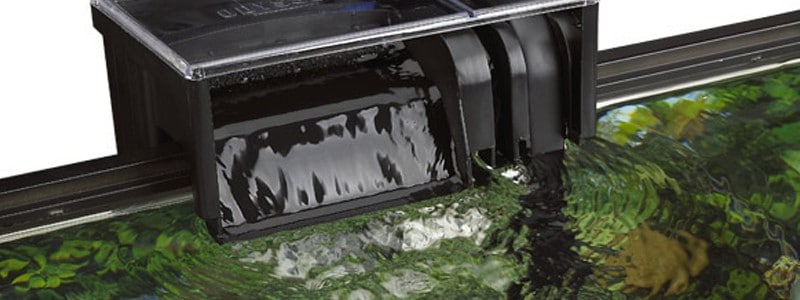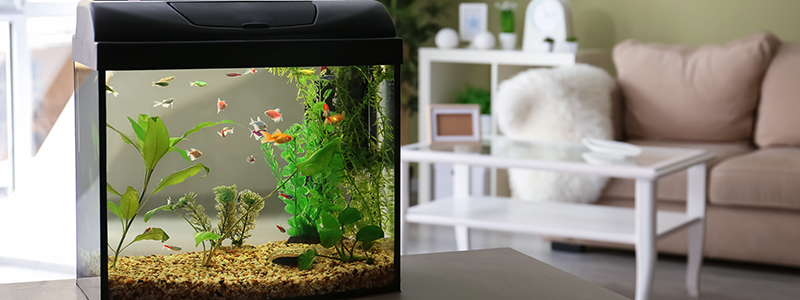The first thing that most fish keepers learn about when establishing a new tank is the importance of having an adequate filter. There are many types of filtration systems on the market, and they all have varying levels of intensity and methods of filtering. Mechanical and biological filtering are both important steps for keeping the water quality of your tank in good condition, and there are plenty of multifunctional filters that offer both. Since adequate filtration is imperative to a successful aquarium, you might find yourself wondering whether it’s ok to have multiple filters for your fish tank?
If your aquarium is large enough, it is completely fine to have multiple filters for your fish tank. There are even some instances where having multiple filters can be more beneficial than one large filter. The more filtration you have, the easier it will be to perform aquarium maintenance without disturbing your ecosystem. The only thing to pay attention to when adding extra filtration to your tank would be the increase in water flow. Depending on the fish that you have and the size of the tank, the increased water flow might be too much for them to handle.
Benefits to having Multiple Fish Tank Filters
There are plenty of benefits to having multiple filters, especially if you have a large tank. Bacteria is a natural and important part of the filtration process for your tank. They help break down waste and neutralize the harmful chemicals produced during the nitrogen cycle. Bacterial colonies will establish all over your aquarium, but the most important place they will inhabit is your filter. The reason it’s important for them to live there is that your filter will constantly be pulling water through it, allowing all of it to encounter the colony.
This is where having multiple filters can be more beneficial than one large filtration system. If you are relying on one large filter to clean your large tank, chances are you have invested in a powerful model. A filter needs to be quite strong in order to cycle through a large quantity of water. With stronger filters, the water is pulled through with more force, which can lessen the direct contact it has with the bacteria colony. Having several smaller filters allows you to process the same amount of water, but more gently so that it has ample opportunity to come into contact with the bacteria that will help to clean it.
Having multiple filters can also help in an established tank where you don’t want to risk disaster should your current filter break. Having two filters can offer peace of mind because they will both establish colonies of beneficial bacteria. In the event that one filter breaks or needs replacing, you will have a pre-established filter to keep things running until you get things back in order. Introducing a new filter to an established aquarium can be a tricky and time-consuming process, so having a backup can be a real lifesaver.
Another great benefit of having multiple filters is that you can alternate the cleaning schedules for each filter in order to further protect your bacteria colony. When cleaning out a filter, even with the utmost care, you are likely going to lose some of the valuable bacteria that are a vital part of the biological filtration cycle. As with everything related to caring for aquarium water quality, disrupting the balance of any organism in your tank can lead to potential problems. Having multiple filters enables you to stagger the filter changes so that there is always one filter- and by extension, one bacterial colony- left undisturbed to keep things running smoothly.
Establishing New Tanks with an Old Filter
Another great benefit of running multiple filters in your tank is that it gives you a great method for establishing a new tank with some of your existing filter bacteria. Instead of going through the time-consuming process of cycling a new tank from scratch, using an old filter in your new tank can get things moving much faster. Many aquarists can attest that keeping fish can be really addicting, so when you start itching to add another tank to the collection you will be glad you have a pre-established filter ready to cycle your tank speedily.

Low Maintenance, Not No Maintenance
Although filters are absolutely necessary for maintaining good water quality, it doesn’t mean that there is no maintenance required. The biological filtering that comes from an established bacteria colony is very important in managing the nitrogen cycle- but is not a hands-free system. The water in your tank will need to be partially changed on a regular basis in order to keep less harmful but still toxic chemicals from building up. How often you will change the water will depend on how large your aquarium is, and how many fish are kept in it (the “bioload”).
It’s also important to note that having two filters doesn’t mean you can get away with never cleaning them out. Having two filters might decrease how often you need to clean out your filters, but you’ll still need to do it occasionally.
Redundant Aquarium Filtration
When you start adding multiple filters to an aquarium, you might be tempted to add more fish than your tank can handle. After all, adding more filters means there is more power to increase the bioload, right? Not really. The important thing to remember with multiple filter setups is that the filtration is only scalable in relation to the volume of water in your tank. For example, if you have a 100-gallon tank and you have two filters each rated for 50 gallons, you will have enough filtration for your 100-gallon tank. However, if you decide to upgrade those filters so that they are each rated for 75 gallons, that’s not a green light to stock your tank like it’s 150 gallons. The filtration will not be enough because the volume of the water in the tank is not enough to sustain it. That being said, if you decide to also upgrade your tank to 150 gallons, your filters will be enough.
Cons of Having Multiple Filters
In most cases, having two filters is a benefit and is recommended. However, there are a few exceptions where it might not be a great idea to have multiple filters. All filters move water around the tank as they run, and some are more powerful than others. This movement is called water flow. If you have two filters, you are going to increase the water flow, which is ideal for reef tanks and filter feeders, but might not be a great fit for other aquariums. For example, in a small tank, increased water flow might be too much for your fish to handle because there are not a lot of areas for the water to move around. Some fish are extra sensitive to high water flow, such as Bettas, small fish, and fry. It just takes too much energy for them to be constantly swimming against the current. A single low-flow filter would be a better choice for them.
It’s also worth noting that a higher water flow can also pose a problem for heavily planted aquariums. Plants need CO2 to grow, and C02 will stay in the water longer if the surface isn’t disturbed. If you have a heavily planted tank or are getting started in aquascaping, you will probably want to stick to a single filter.

Conclusion
Using multiple filters for your fish tank is by and large a terrific idea. Having multiple filters takes the burden off one single filter, and can be very helpful in the event that one of them stops working. Multiple filters in a tank also give more areas for beneficial bacteria to colonize, which will lead to more balanced and healthy water quality for your aquarium. This is a great feature when it comes time to clean one of the filters because you are less likely to wash away some of that valuable bacteria and throw the nitrogen cycle off-balance. Additionally, having multiple filters can come in really handy in the event that you would like to make a new aquarium. The extra filter can be used in a fresh tank to help with the initial cycling process and can get things up and running much faster than starting from scratch. When going to multiple filters it’s important to remember how the filtration will scale along with the volume of water. Having multiple filters doesn’t mean that you can overstock your aquarium, and you should always follow guidelines for the size of your tank. If you have a small aquarium or fish that are sensitive to water flow, then having two filters might be too overwhelming for them. In those cases, you will be better off sticking to a single filter, especially one that is specifically categorized as low flow, or adjustable flow.
Related Topics
If you like the article above, here are some other similar articles you should check out!




